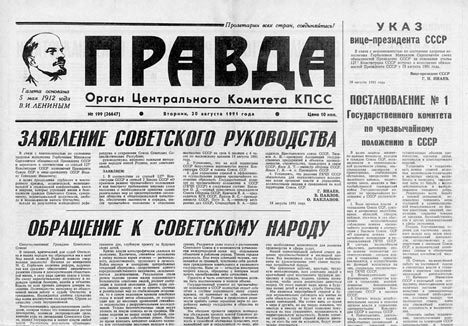"In Saratov last summer [late 90's], every home I visited had... the rough brown kind that sells for about a rouble a roll. "American-style" (as I think of it) TP was available, but at 4 or 5 roubles I never saw anyone buy it. These were middle-class homes by Russian standards, though not necessarily "intelligentsia" (e.g., a fireman and a teacher). Public facilities were a different story. The men's rooms at both SGU and SGTU had no toilet paper and, indeed, no toilets -- just a hole in the floor."
For some reason, communists didn't want people to have decent toilet paper. What was available was of very poor quality and sometimes you couldn't even get that. People just used newspaper. Everyday. Irony was apparently not a concern either as the newspapers people were literally wiping their ass with were all communist propaganda. While some did note receiving some satisfaction from this, it was likely a small consolation.

"...Closing the door behind you, you begin to choke on the sharp stench of urine as you desperately try to find a dry patch on the flooded floor. Needless to say, there is no seat on the toilet, but by the time you visit that famous restaurant, you will already know that such a thing is not to be expected. And then you have to pull a dirty piece of rope in order to splash the water. Soap is nowhere to be seen and toilet paper seems to be a completely unknown thing. There is not a single public toilet in Bucharest where you would find it."That's great. Why do this? Why not create, say, a Ministry of Toiletry? 1. ideological purity. Determined people are willing to put up with a lot of things in pursuit of living according to their principles. In their minds, it's a long term decision where things might be rough now but eventually they will get better. It's honorable. unless you're wrong, then it's stupid and cruel. "Sorry, but we only have so much capitol and we need it for stuff like tanks, statues, and other basic necessities of life." (Sound familiar?) 2. demand creates more demand. If people get toilet paper they are going to prefer it to newspaper so they will want to keep buying it. Once they go forward, they won't go back. Momentum caused by a rumor that a Berlin wall checkpoint being open was what eventually brought it down. The lesson for dictators is don't let people think a rumor like that is even slightly plausible. 2.5 Why not just use the paper they use to make newspapers for actual toilet paper? Then the whole thing falls apart because there's no propaganda keeping people in line! 3. Finally, here's what a Russian guy told me "and so what? I remember that time, i was a child. We had old newspapers as toilet paper. They were smooth enough. I think it's more nature-friendly thinking - to use paper as much, as you can - read news and after that go to toilet (especially, that news were so big propaganda). But westerners buy things and throw them out and start consuming other ones, just now people start to think about recycling - thing that soviets were doing lot earlier. And i'm not communist."
So the last and least plausible reason is that the communists were massively ahead of the ball on environmentalism ( a sick joke considering the industrial and nuclear pollution in their countries). Post communism, standards of living are rising. With a freer press people are more cognitive of how others in the western world live. This study was done in 2000 and by the end they were catching up. I'd probably put off visiting the famous restaurant in Bucharest for a while though.

